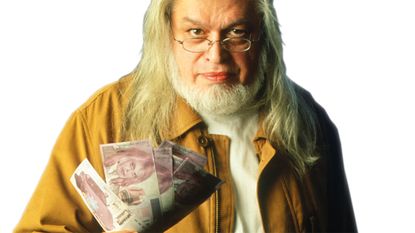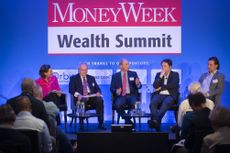Great frauds in history: Jean-Pierre van Rossem's money-making machine
Jean-Pierre van Rossem told investors he had a supercomputer able to make money by predicting market movements. He didn't.


Belgian Jean-Pierre van Rossem (born 1945) was a star economics student at the University of Ghent, making money on the side writing other students’ dissertations. He became a Marxist, then won a scholarship to study under Lawrence Klein, a Nobel Prize-winner who pioneered the use of computers to predict market fluctuations. Van Rossem later started his own company in the US, but went bankrupt financing a heroin habit and served time for fraud.
What was the scam?
Upon release he returned to Europe, later claiming he intended to join the Baader-Meinhof gang of far-left militants, but running off instead with the wife of a rich industrialist (“I decided to punish capitalism by taking his wife”). To finance her shopping habit, as he put it, he then set up in business as a stockmarket guru, founding MoneyTron, an investment firm that had a supercomputer able to predict market movements.
Where did he get that?
It’s a mystery as nobody ever got to see the machine, which was kept behind a locked door. Van Rossem still attracted large sums from wealthy investors, including members of the Belgian royal family, by the simple expedient of appearing to be wealthy and successful. By 1989 he claimed the firm was managing $7bn in assets. In reality, he was running a Ponzi scheme, taking money from new investors to pay older ones and bankroll his own extravagant lifestyle. At one point he owned the Formula 1 racing team Onyx, a $4m yacht, two aircraft and 108 Ferraris.
Subscribe to MoneyWeek
Subscribe to MoneyWeek today and get your first six magazine issues absolutely FREE

Sign up to Money Morning
Don't miss the latest investment and personal finances news, market analysis, plus money-saving tips with our free twice-daily newsletter
Don't miss the latest investment and personal finances news, market analysis, plus money-saving tips with our free twice-daily newsletter
What happened next?
Van Rossem’s empire collapsed in 1990 after a $50m cheque to a French businessman bounced. He was later convicted of fraud and sentenced to five years in jail. “The good news is that there will be one capitalist less in the world, the bad news is that he is me,” he said. Parliamentary immunity delayed his sentence until 1995, however: he was elected to parliament as a libertarian dedicated to making everyone rich and abolishing marriage and the monarchy.
Lessons for investors
As Van Rossem himself said: “If you show a million returns to millionaires, they no longer ask questions.” Swindlers down the ages have known this truth. Be sceptical.
Matthew graduated from the University of Durham in 2004; he then gained an MSc, followed by a PhD at the London School of Economics.
He has previously written for a wide range of publications, including the Guardian and the Economist, and also helped to run a newsletter on terrorism. He has spent time at Lehman Brothers, Citigroup and the consultancy Lombard Street Research.
Matthew is the author of Superinvestors: Lessons from the greatest investors in history, published by Harriman House, which has been translated into several languages. His second book, Investing Explained: The Accessible Guide to Building an Investment Portfolio, is published by Kogan Page.
As senior writer, he writes the shares and politics & economics pages, as well as weekly Blowing It and Great Frauds in History columns He also writes a fortnightly reviews page and trading tips, as well as regular cover stories and multi-page investment focus features.
Follow Matthew on Twitter: @DrMatthewPartri
-
 Stop inheritance tax perk on pensions, says IFS
Stop inheritance tax perk on pensions, says IFSThe government could raise billions of pounds in revenue by closing inheritance tax loopholes, such as on pensions and AIM shares. Is your pension at risk?
By Ruth Emery Published
-
 Revealed: Best buy-to-let property hotspots in the UK
Revealed: Best buy-to-let property hotspots in the UKLooking for the best buy-to-let property locations in the UK? We reveal the top 10 postcodes with the strongest rental returns
By Oojal Dhanjal Published
-
 Halifax: House price slump continues as prices slide for the sixth consecutive month
Halifax: House price slump continues as prices slide for the sixth consecutive monthUK house prices fell again in September as buyers returned, but the slowdown was not as fast as anticipated, latest Halifax data shows. Where are house prices falling the most?
By Kalpana Fitzpatrick Published
-
 Rents hit a record high - but is the opportunity for buy-to-let investors still strong?
Rents hit a record high - but is the opportunity for buy-to-let investors still strong?UK rent prices have hit a record high with the average hitting over £1,200 a month says Rightmove. Are there still opportunities in buy-to-let?
By Marc Shoffman Published
-
 Pension savers turn to gold investments
Pension savers turn to gold investmentsInvestors are racing to buy gold to protect their pensions from a stock market correction and high inflation, experts say
By Ruth Emery Published
-
 Where to find the best returns from student accommodation
Where to find the best returns from student accommodationStudent accommodation can be a lucrative investment if you know where to look.
By Marc Shoffman Published
-
 Best investing apps
Best investing appsWe round up the best investing apps. Looking for an easy-to-use app to help you start investing, keep track of your portfolio or make trades on the go?
By Ruth Emery Last updated
-
 The world’s best bargain stocks
The world’s best bargain stocksSearching for bargain stocks with Alec Cutler of the Orbis Global Balanced Fund, who tells Andrew Van Sickle which sectors are being overlooked.
By Andrew Van Sickle Published
-
 Revealed: the cheapest cities to own a home in Britain
Revealed: the cheapest cities to own a home in BritainNew research reveals the cheapest cities to own a home, taking account of mortgage payments, utility bills and council tax
By Ruth Emery Published
-
 UK recession: How to protect your portfolio
UK recession: How to protect your portfolioAs the UK recession is confirmed, we look at ways to protect your wealth.
By Henry Sandercock Last updated